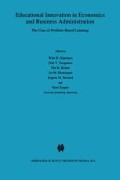Summary
International competition is increasing not only in production and distribution of goods but also in the use and development of human resources. Today private industry urgently needs employees who are generalists rather than specialists, who are thinking and acting interdisciplinary and react flexible and creative to new challenges. While specialised knowledge becomes obsolete much quicker than it used to, conceptional and social competencies, as well as management skills combined with high motivation, speedy action and innovativeness are characteristics of qualified professionals.
In contrast to this demand of private business and industry, higher education traditionally is focused on the acquisition of generally valid theoretical knowledge, which is taught in a systematic manner within distinct disciplines. Thus academic education favours passive learning and reproduction of prestructured textbook knowledge. Strict individual and self-centered working is rewarded, while teamwork and social skills of students, which are essential in the real business life, aren’t taken into account. As social competencies and management skills cannot be taught by normal classroom teaching, new educational concepts, which encourage and reward active learning are necessary. In this context educational cooperation with private business and industry is crucial.
A new challenging concept of business related education are project studies, which recently have been developed and established at FH Pforzheim. As in a consultancy teams of four to six students work on real tasks of industry in close cooperation with a company. Supported and advised by their professors they have to find and work out feasible solutions within a given time. The results finally are to be documented in a comprehensive report and then presented to the company. The role of the academic staff in such project work can be described as a motivator, mentor and moderator.
This new type of action learning within an open and multidimensional educational environment emphasises the process of learning instead of the simple acquisition of knowledge. Working in teams on real problems together with their professors and employees of the companies, contributes substantially to the personality of the students. Leadership competence, management skills, social skills and reliability are forced and turn the students to ‘change agents’ more than to hesitating classical academics.
Of course there are also limits of project studies. Due to a series of didactic and economic reasons, traditional teaching methods are indispensable. But with this knowledge as a basis, project studies and action learning are an ideal complement to increase the quality of education and to achieve the needs of business and industry. Additional costs of this type of education are only marginal and prolongation of study time hasn’t to be feared. All in all these educational alliances of universities and private business create a highly innovative and productive educational culture, which fits to the needs of industrial societies in an increasing competitive world.
Access this chapter
Tax calculation will be finalised at checkout
Purchases are for personal use only
Preview
Unable to display preview. Download preview PDF.
References
Arbeitskreis beim Ministerium für Wirtschaft, Mittelstand und Technologie des Landes Baden-Württemberg (1990). Qualifikationsbedarf 2000, Zwischenbericht. Stuttgart.
Differ, E. (1992). Internationales Management in unterschiedlichen Kulturbereichen, 2. Aufl.. München, Wien.
Feuchthofen, J. E. (1991). Trends und Tips zum aktuellen Bewerberprofil für Ost-und Westabsolventen. In Landsberg, G. v. (Ed.), Karriereführer Fachhochschulen, 9 (pp. 233–239 ). Ausgabe, Köln.
FH Pforzheim/Hochschule für Gestaltung, Technik und Wirtschaft ( 1993, November). Integriertes Projektstudium, Ergebnisse eines Modellversuchs. Pforzheim.
Ghoshal, S., Arnzen, B., Brownfield, S. (1992). A Learning Alliance between Business and Business Schools: Executive Education as a Platform for Partnership. California Management Review, 35, 50–67.
Grosse-Oetringhaus, Wigand, F. (1993). Sozialkompetenz–ein Anspruchsniveau für die Personalpolitik. Zeitschrift für betriebswirtschaftliche Forschung und Praxis, 3, 270–295.
Huber, A. (1992). Gesucht–Der Generalist mit Persönlichkeit. Psychologie heute, April, 36–40.
Kreuzer, S. (1993). EurofLink-Programm, Internationale Projektstudien in der vorlesungsfreien Zeit. Zwischenbericht, Pforzheim
Mandl, H., Gruber, H., Renkl, A. (1993). Das träge Wissen. Psychologie heute, September, 64–69
Mead, R. (1992). Cross-Cultural Management Communication. Chichester etc.
Moczadlo, R. (1993). LiPS, Leitfaden integrierte Projektstudien. Zwischenbericht, Pforzheim.
Moynihan, M.. (1993). Global Manager, Recruiting, Developing, and Keeping World Class Executives. New York: The Economist Intelligence Unit.
Perlitz, M. (1993). Internationales Management Stuttgart: Jena.
Weihrich, H., Koontz, H. (1993). Management - A Global Perspective, 10. edition. New York.
Author information
Authors and Affiliations
Editor information
Editors and Affiliations
Rights and permissions
Copyright information
© 1995 Springer Science+Business Media Dordrecht
About this chapter
Cite this chapter
Kreuzer, S., Moczadlo, R. (1995). Discovery Of The Reality. Experiences With Integrated Project Studies. In: Gijselaers, W.H., Tempelaar, D.T., Keizer, P.K., Blommaert, J.M., Bernard, E.M., Kasper, H. (eds) Educational Innovation in Economics and Business Administration. Educational Innovation in Economics and Business, vol 1. Springer, Dordrecht. https://doi.org/10.1007/978-94-015-8545-3_25
Download citation
DOI: https://doi.org/10.1007/978-94-015-8545-3_25
Publisher Name: Springer, Dordrecht
Print ISBN: 978-90-481-4504-1
Online ISBN: 978-94-015-8545-3
eBook Packages: Springer Book Archive

